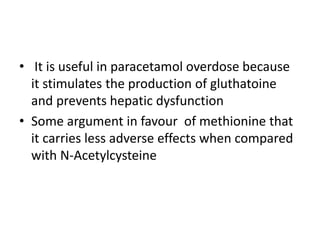

These mechanisms of protection (inhibition of Cyp2E1 and JNK) and an extended efficacy compared to NAC could be verified in primary human hepatocytes.

In addition, fomepizole treatment, unlike NAC, prevented APAP-induced kidney damage and promoted hepatic regeneration in mice. In animal studies, fomepizole effectively prevented APAP-induced liver injury by inhibiting Cyp2E1 when treated early, and by inhibiting c-jun N-terminal kinase (JNK) and oxidant stress when treated after the metabolism phase. Fomepizole (4-methylpyrazole), a clinically approved antidote against methanol and ethylene glycol poisoning, recently emerged as a promising candidate. Thus, additional antidotes with an extended therapeutic window may be needed for these patients. However, for late-presenting patients or after ingestion of very large overdoses, the efficacy of NAC is diminished.

The standard oral or intravenous dosing regimen of NAC is highly effective for patients with moderate overdoses who present within 8 h of APAP ingestion. N-acetylcysteine (NAC) is still the only FDA-approved antidote against APAP overdose 40 years after its introduction. Acetaminophen (APAP) overdose can cause hepatotoxicity and even liver failure.


 0 kommentar(er)
0 kommentar(er)
